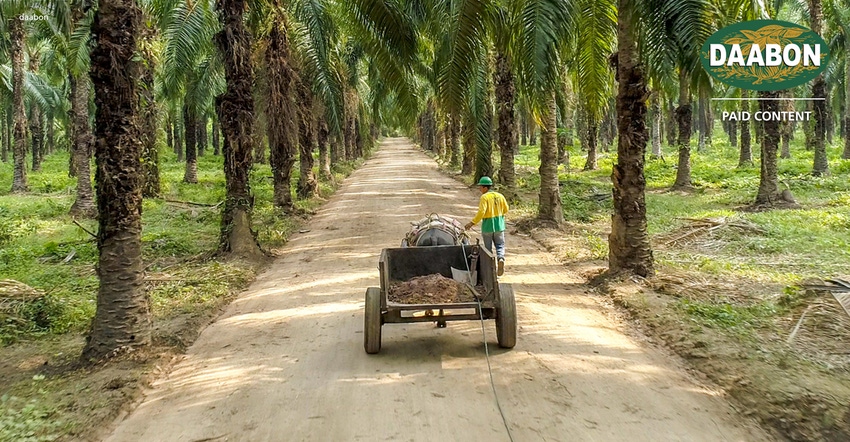10 facts brands and retailers should know about sustainable palm oil – article
Palm oil is everywhere, which is why truly sustainable palm oil is a critical part of brands' and retailers' fight to protect the planet.
April 15, 2022

Sponsored by Daabon
Today, consumers not only seek clean, ethically sourced and natural ingredients that are good for the body, they also want to make sure their purchases protect the planet, too. Nowhere is this more relevant than in the world of palm oil, where leading brands are putting the focus on sustainability to rewrite palm’s history and show that the industry can be a force for good. This is of upmost importance now as demand for palm is undergoing exponential growth. Here are 10 facts brands and retailers should know about this ubiquitous ingredient.
1. Palm oil is everywhere—and we mean, everywhere.
In nearly every aisle of the supermarket, palm oil is a component of everything from pizza, doughnuts and cookies to soap, lipstick and even biodiesel. The World Wildlife Foundation estimates more than 50 percent of packaged foods contain palm oil. Many people are surprised to learn they are using palm oil multiple times throughout their day.
2. Palm oil is the world’s most popular oil.
Palm oil is the most widely used edible oil in the world, particularly in Asia. That’s a huge piece of the pie when you consider that everyone uses edible oil for one application or another. Palm oil, is also often considered a perfect replacement for trans fats and is well suited to sautéing and frying due to its high smoke point.
3. Sustainable palm oil is restorative.
Stringent regulations dictate the production of sustainable palm oil, which firmly prohibits the three biggest issues common in standard palm oil production: burning, deforestation and habitat loss. Additionally, sustainable palm does not clear land, instead it reuses existing farmlands, creates wildlife corridors and prevents planting on high conservation value areas—zones that have special importance environmentally or socially for indigenous groups and local communities.
4. Sustainable palm is focused on clean energy.
Leaders in the sustainable palm movement have made strong commitments to green energy production. Daabon’s methane recapture program produces enough energy to power the company’s extraction mill and put energy back on the grid. With this technology the company creates clean biofuel from the mill’s wastewater, purifying the water and creating a new, green energy source in the process.
5. Sustainable palm helps prevent global warming.
Deforestation is a large contributor to climate change. By avoiding deforestation, sustainable palm prevents the release of CO2. Certifications play a key role here: A 2020 study found that palm certified by the Roundtable on Sustainable Palm (RSPO)— the governing body for sustainable palm—reduced emissions significantly. Daabon also was one of the first 100 companies to sign Amazon’s Climate Pledge to reach net zero carbon emissions by 2040, a decade ahead of the Paris Climate Agreement.
6. Sustainable palm oil strengthens communities.
Certified sustainable palm oil not only ensures that farming and production processes are safe for the environment, it also creates a positive impact on workers and local communities. Criteria put in place by the RSPO protects workers and local ecosystems from exploitation, while making sure that local and international labor standards are upheld and protect culturally and historically significant lands. Daabon employs hundreds of family farmers who say their partnerships with Daabon and sustainable palm have been life changing both for them and for the generations to come.
7. The answer is sustainable palm, not a palm boycott.
It’s becoming widely reported that boycotting palm would actually create greater environmental problems—a view that is now supported by the RSPO and the World Wildlife Fund (WWF). Palm oil cultivation is incredibly efficient—producing 4 to 10 times more oil than sunflower, soybean and canola oil per unit of cultivated land. Replacing palm oil production with any of these other oils requires the clearing of much more land and with less frequent harvests. “The best way to make a positive impact is to ensure the products you purchase, which contain palm oil, are produced and sourced sustainably,” states the RSPO.
8. Sustainable palm oil is plant-based.
The growth of sustainable palm oil fits right in with the plant-based eating movement, which continues to grow at an exponential rate. This movement is important as we look at climate change and other environmental issues related to the food industry today. Sustainable palm oil is naturally vegan and a perfect complement to full plant-based diets, as well as flexitarian eating, which also encourages eating more plant-based foods.
9. Customers want more sustainable palm oil.
A recent study by MarkPlus found that 82 percent of participants are willing to swap out their daily palm oil products with products that use only sustainable palm. The biggest challenge is not consumer desire but rather the ability to incorporate more sustainable palm into their routine, based on products that are available to them. Retailers play an important role in carrying products that use only sustainable palm.
10. Retailers and brands are vital to the sustainable palm movement, too.
Retailers and brands can help ensure that palm oil is protecting the planet and its inhabitants by only choosing sustainable palm. To achieve this, ask suppliers these important questions: Where are you sourcing your palm oil from? Is it certified sustainable? How does it support the community? Getting educated about sustainable palm oil and starting these conversations when you’re buying and looking for palm certifications is one of the most reliable ways to verify that you’re making the responsible choice when it comes to palm oil—a sustainable choice.
You May Also Like


